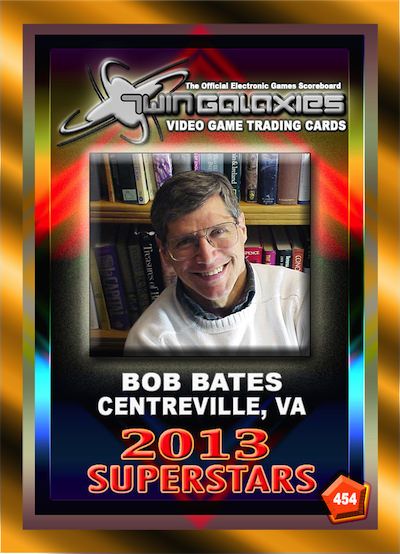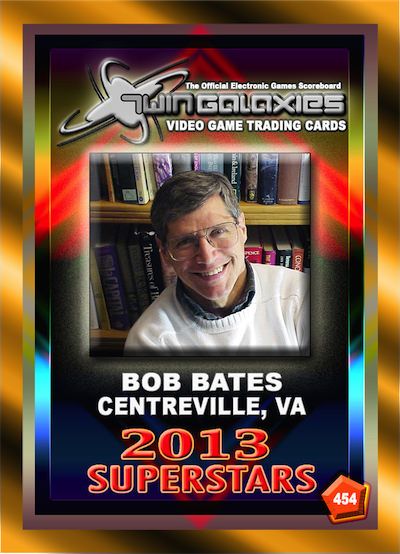- Home
- Articles
- Trading Card Spotlight
- Trading Card Spotlight - Bob Bates
Trading Card Spotlight - Bob Bates
Our next Trading Card Spotlight features Bob Bates who currently is displayed on card number 454, from the Superstars of 2013 Collection. As game designer, Bob has created more than 40 games that have won many awards in the industry and overall has sold over 6 million copies of his games. Some of them include Unreal 2 for the PC, Spiderman 3 for home consoles and Eric the Unready, also for the PC. He his Co-Founder of “Game Designers Workshop”, and annual conference of game designers. Bob is a Lifetime Achievement Award from the IGDA (International Game Developer Association) and selected in 2010 as the IGDA’s person of the year.
Who is your favorite video game character of all time and what makes that character special?
My favorite character of all time is Floyd, from Steve Meretzky’s game called Planetfall. He was a great robot companion to the player, always playful and always optimistic. When you would go to save a game, Floyd’s eyes would light up and he would say, “Oh boy! Are we going to do something dangerous now?” For gamers of a certain generation, Floyd will always have a place in their hearts.
Do you remember when you created your first video game or arcade and what do you remember about the experience?
I started writing my first computer game in 1986. It was a Sherlock Holmes game for Infocom. I was new to the industry, and it was quite a heady experience to be writing for a company that was so famous.
What does it take to be a video game creator, and what advice would you give a person today who would like to get into the industry?
I believe now, as I have always believed, that the best game-makers are Renaissance people. They are not single-dimensional. They are curious about a broad range of topics and tend to be lifelong learners. The advice I give to people starting out in the industry is that it’s important to know why you want to make games. It isn’t enough to simply like playing them. You have to have something interesting to say, and it’s hard to achieve that if your interests are so narrow that all you really know about are games themselves.
What are your opinions about today’s generation of video games? How do you compare them to older, classic games?
Overall, today’s games are prettier than the classics, and usually much simpler. Older games were targeted at a niche market, while most of today’s games try to have mass market appeal.
Did you ever think when you were younger you would be on a video game trading card?
Not at all. When I was younger, there was no such thing as a video game!
What does it take to be a professional writer today?
You have to be versatile. Even within the discipline of game writing alone, there are many styles you have to master, including writing dialog, world backstories, marketing copy, etc.
How has writing today changed from when you were younger? What do you like or dislike about the changes?
People have much less patience with the written word, especially when it appears on a screen. Everything today has to be quick and concise, otherwise the reader will press a key and move on.
What do you think about electronic books that you can download versus the actual physical hard copy?
I have mixed feelings. I love the convenience of e-books, but I miss holding a book in my hands. I love being able to search back through the book to find, for example, the first time a character is introduced. But I miss something as simple as seeing the title of the book as I’m reading. When I turn on my Kindle, it quite conveniently opens to the last page I was reading, but sometimes the only times I see the book title are when I buy it and first open it. Consequently, I sometimes finish a book and a week later I can’t remember what the title was!
What is your favorite game you have worked on in your career?
I’ve worked on about 50 games, but I’d have to say my favorite was Eric the Unready. It was a ton of fun to make and it was really well-received. The two of those don’t always go hand-in-hand.
What is your favorite portable gaming device and why?
I love playing games on my iPad. It wasn’t designed as a gaming device, but it’s perfect for today’s casual games.
Do you prefer Arcade or console gaming and why?
I prefer console gaming, because the games are much more forgiving. I can play them at my pace, I can save them and come back. And because I’m not great at action games, Arcade games usually kick my butt.
What games today do you play and what are your favorite genres of games?
I still play all genres of games, but not as frequently as I used to. I do play a lot of casual games, because that’s an area I do a lot of work in. But my favorite genre is still adventure games that have a good story.
Are video games today aimed mainly at children, adolescents or adults?
There are games targeted at all three markets, and each of those markets is huge. Gaming has become a mainstream activity, and you’ll find players who are 3 or 93, and all ages in between.
Do you believe some video games are too violent and lead to violence in America today?
Certainly some video games are more violent than I personally care for. But the percentage of violent games is remarkably low when you look at the industry as a whole. The violent ones get a lot of press because of their shock value. But it’s a very small segment of the market. As for a connection between games and violence, no study has ever shown that one exists, and several show that it does not. Some speculate that there is actually a negative correlation, which is to say that people who play violent games tend to be less violent in the real world.
Which company today, in your opinion, makes the best games and why?
Games are really hit-or-miss affairs. As they are being made, it’s almost impossible to tell how good the final product will be. Consequently, no company puts out great games all the time, and sometimes great games appear almost out of nowhere, from a company you’ve never heard of before.
Do you like it when Hollywood makes a movie from the video game?
Not really. I’m grateful that games have entered the mainstream to the point where they have attracted Hollywood’s attention. But even after all these years, games still really aren’t all that great at telling stories, and for a movie to be good it has to have a good story. So, there’s a mismatch there that is very hard to overcome.
Are you still involved with gaming today, and what role do you play?
I’m still active as a game designer and writer. In fact, I recently published a brand-new text adventure called Thaumistry: In Charm’s Way. It’s a comedy game, a modern fantasy set in New York City with a bunch of oddball characters and funny spells.
Where do you see Video gaming in the next 20 years?
It’s almost impossible to say. Gaming tends to follow devices, and new devices are coming along all the time. But even as new ones come along, the old ones hang around. So even though Virtual Reality, for example, will have fully arrived within 20 years, people will still be playing on their TVs, their PCs, their phones, and anything else that can project images and sounds.


